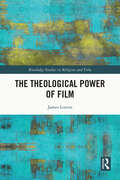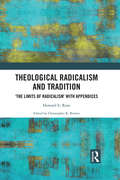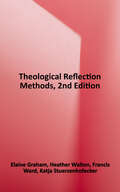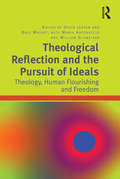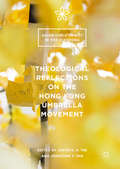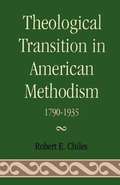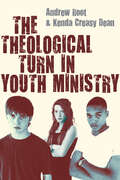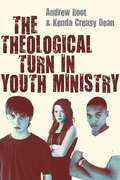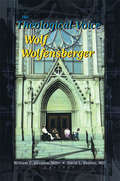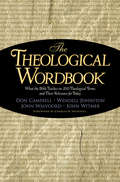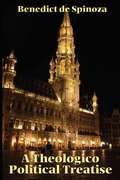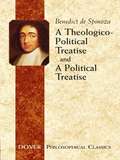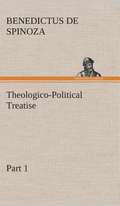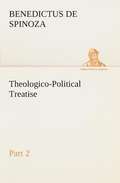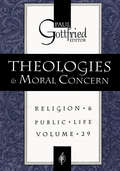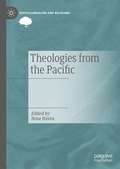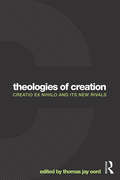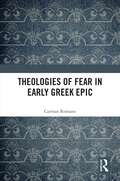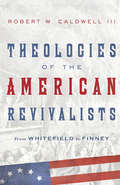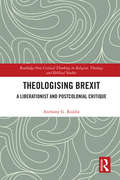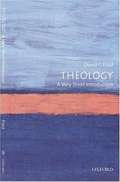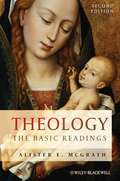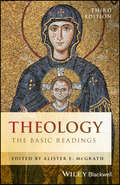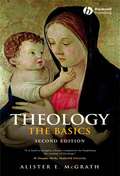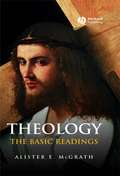- Table View
- List View
The Theological Power of Film (Routledge Studies in Religion and Film)
by James LorenzThis book explores the theological power of film and seeks to render a properly theological account of cinematic art. It considers: What theology and theological practice does cinematic art give rise to? What are the perceptual and affective potentials of film for theology, and what, if anything, is theological about the cinematic medium itself? The author argues that film is a fundamentally embodied art form, a haptic and somatic medium of perception-cum-expression. This, combined with the distinct temporal aesthetic of film, invests cinema with profound theological potentials. The chapters explore these potentials through theological-cinematic analysis, emphasising the themes of encounter, embodiment, time, and contemplation, as well as three intimately connected doctrines of Christian theology: creation, incarnation, and eschatology. Throughout the book, the films and writings of the Russian director Andrei Tarkovsky emerge as a singular illustration of the theological power of film, becoming a crucial resource for theologicalcinematic analysis.
Theological Radicalism and Tradition: 'The Limits of Radicalism' with Appendices
by Howard E. Root‘The limits of radicalism are those which end not in chaos but in the breaking of fresh ground.’ Howard E. Root Previously unpublished––and only recently rediscovered by Dr Christopher R. Brewer in an uncatalogued box in the archives of Lambeth Palace Library––Canon Howard E. Root’s 1972 Bampton Lectures, ‘The Limits of Radicalism’, have to do with nothing less than ‘what theology is’, a topic no less relevant today than it was in 1972. Against the radical reductionism of his time, Root defended the integrity of theology and ‘theological truth’. Advocating a ‘backward-looking’ radicalism, he thought that tradition should display ‘recognisable continuity’, and yet at the same time––against reductionistic tendencies––that it might be enriched and enlarged via a wide variety of ‘additive imagery’ including, though not limited to, poetry and pop art, music and even television. We must ‘begin where we are’, said Root, for we cannot, in the manner of Leonard Hodgson, ‘think ourselves into the minds and feelings of men 2000 years ago.’ In this volume, which begins with a substantial, mostly biographical introduction, Dr Brewer argues that Root––a backward-looking radical who defended metaphysics and natural theology, and insisted that theologians look to the arts as theological resources––anticipates the work of David Brown and others concerned with tradition and imagination, relevance and truth. A fascinating glimpse into the recent history of British Christianity, Root’s lectures, as well as the related appendices, are essential reading for theologians interested in the dynamics of a developing tradition and the theme of openness, as well as those with a particular interest in 1960s Cambridge radicalism and the British reception of the Second Vatican Council.
Theological Reflection: Methods
by Elaine Graham Heather Walton Francis WardWidely regarded as a classic textbook on theological reflection.- Offers new updated bibliography and updated examples, ensuring its value as a core textbook in the field for years to come.- a best-selling title for SCM Press, and required reading for numerous modules on the subject. theological Reflections: Methods, Offers a comprehensive collection of models of theological reflection. By bringing this diverse collection together in one place, the editors create a unique reference work that allows a clear and visible contrast and comparison as each model is treated formally and in a standard format. Throughout each chapter the distinguishing features of the model are examined, the geneology and origins are discussed, worked examples of the model applied to contemporary theology are provided, and critical commentary, future trends and exercises, and questions are provided. Now firmly established as an essential text on theological reflection, this new edition has been revised and updated with a new introduction, updated examples, and refreshed bibliographies
Theological Reflection and the Pursuit of Ideals: Theology, Human Flourishing and Freedom
by Dale Wright Maria AntonaccioContemporary thought is marked by heated debates about the character, purpose and form of religious thinking and its relation to a range of ideals: spiritual, moral, aesthetic, political and ecological, to name the obvious. This book addresses the interrelation between theological thinking and the complex and diverse realms of human ideals. What are the ideals appropriate to our moment in human history, and how do these ideals derive from or relate to theological reflection in our time? In Theological Reflection and the Pursuit of Ideals internationally renowned scholars from a range of disciplines (physics, art, literary studies, ethics, comparative religion, history of ideas, and theology) engage with these crucial questions with the intention of articulating a new and historically appropriate vision of theological reflection and the pursuit of ideals for our global times.
Theological Reflections on the Hong Kong Umbrella Movement
by Justin K.H. Tse Jonathan Y. TanThis book gathers the voices of four local Hong Kong theologians to reflect on the 2014 democracy protests in the city from the perspectives of Catholic social teaching, feminist and queer intersectionality, Protestant liberation, and textual exegesis. The volume also includes an extended primer on Hong Kong politics to aid readers as they reflect on the theology underlying the democracy protests. September 28, 2014 is known as the day that political consciousness in Hong Kong began to shift. As police fired eighty-seven volleys of tear gas at protesters demanding "genuine universal suffrage" in Hong Kong, the movement (termed the "Umbrella Movement") ignited a polarizing set of debates over civil disobedience, government collusion with private interests, and democracy. The Umbrella Movement was also a theological watershed moment, a time for religious reflection. This book analyzes the role that religion played in shaping the course of this historic movement.
Theological Transition in American Methodism: 1790-1935
by Robert E. ChilesReprinted from the 1965 Abingdon Press edition, this historical study traces the changes that have taken place in Wesleyan theology in America. Focuses on three representative theologians: Richard Watson, John Miley and Albert Knudson; and three central themes of revelation, sin, and grace. Of interest to ministers, theologians and seminary students.
The Theological Turn in Youth Ministry
by Kenda Creasy Dean Andrew RootChristianity TodayWhat haunts your youth group?The questions our youth have are often the same ones that perplexed the great theologians, driving them to search for God in the places God didn't appear to be--places of brokenness, suffering and confusion. What if we let these questions drive our search for God too?Andrew Root and Kenda Creasy Dean invite you to envision youth ministries full of practical theologians, addressing the deep questions of life with a wonderfully adolescent mix of idealism, cynicism and prophetic intolerance for hypocrisy. Follow them into reflection on your own practice of theology, and learn how to share that theology through rich, compassionate conversation and purposeful experience.
The Theological Turn In Youth Ministry
by Andrew Root Kenda Creasy DeanWhat haunts your youth group? So often we avoid talking about doubts and fears because we feel inadequately equipped to address them in any meaningful way. The crisis of existence can't be answered with pat Sunday school formulas or a few Bible verses, let alone another relay race. The questions our youth have are often the same ones that perplexed the great theologians, driving them to search for God in the places God didn't appear to be—places of brokenness, suffering and confusion. What if we let these questions drive our search for God too? Andrew Root and Kenda Creasy Dean invite you to envision youth ministries full of practical theologians, addressing the deep questions of life with a wonderfully adolescent mix of idealism, cynicism and prophetic intolerance for hypocrisy. Follow them into reflection on your own practice of theology, and learn how to share that theology through rich, compassionate conversation and purposeful experience.
The Theological Voice of Wolf Wolfensberger
by William C Gaventa David CoulterDo people with mental retardation have a special prophetic role?In the field of developmental disabilities, Wolf Wolfensberger is famous for his seminal book Normalization. But Wolfensberger is also a theologian, and the two strands of his thought are inextricable. The Theological Voice of Wolf Wolfensberger showcases his theories on the spiritual meaning of mental retardation and other disabilities.Up until now, Wolfensberger's work has been available only in small, hard-to-find publications, mostly in the field of human services. Thus his theological perspectives have not yet been heard in many religious circles. The Theological Voice of Wolf Wolfensberger brings together his essays and presentations from the past thirty years, giving the reader a unique pathway into his pioneering ideas on the spiritual implications of developmental disabilities. In addition, the volume includes critiques of his thought by several noted scholars and practitioners, along with Wolfensberger's response to those critiques.The Theological Voice of Wolf Wolfensberger expresses powerful opinions, some outrageous, all courageous. You will find yourself intently engaged with his provocative theories, including: why installing wheelchair access ramps may actually block full participation of the handicapped in the life of the church how the “deathmaking” culture of the modern world prevents Christians from understanding the meaning of suffering why people with mental retardation are the prophets of our times why most Christians ignore the powerful Biblical call to communality which special gifts of grace people with mental retardation may possess how handicapped and societally devalued patients can be protected from the neglect (or worse) of hospital staff The Theological Voice of Wolf Wolfensberger is challenging, inspiring, and sometimes infuriating. It is bound to stir up controversy among health care professionals, disability advocates, and anyone concerned with spiritual matters. You may not agree with Wolfensberger, as some of the contributors to this volume do not, but he will make you think . . . hard.
Theological Wordbook
by Donald CambellStimulating theology is an oxymoron for most people. "Theology" sounds like something for the severely intellectual, full of complicated ideas that escape the typical Christian reader.In reality, theology is meant to enhance our understanding of God. Most of the words that make up the Christian vocabulary are common words, drawn from the realities of life, and therefore are easily applicable to real life. Based on this premise four leading authors have come together to create this excellent volume.The Theological Wordbook tackles tough words, such as propitiation, regeneration, righteousness, and predestination, but it does so in a natural, plain-spoken manner designed to be enlightening rather than evasive. Also literally dozens of words you are likely to use every day, such as forgiveness, mind, peace, rest, family, truth, and guilt, have profound biblical value. Using The Theological Wordbook can enable you to more fully appreciate what the Bible teaches on these crucial topics and how each of these terms is relevant for life today.As this happens, your understanding of God will expand. And as the words you use, speak, and hear in the community of faith become more familiar, you will become more connected to your own spiritual heritage.The Theological Wordbook is the link between understanding God's Word in your head and accepting it in your heart.
A Theologico Political Treatise
by Benedict De SpinozaRational examination of the Old Testament to show that freedom of thought and speech is consistent with the religious life. True religion consists in practice of simple piety, independent of philosophical speculation. Also unfinished essay on theory of government founded on common consent. One of Spinoza's most important works.
A Theologico-Political Treatise and A Political Treatise
by Francesco Cordasco R. H. Elwes Benedict De Spinoza2 important works. Spinoza's "A Theologico-Political Treatise" presents an eloquent plea for religious liberty, demonstrating that true religion consists of the practice of simple piety, independent of philosophical speculation. In the unfinished "A Political Treatise," the author develops a theory of government founded on common consent.
Theologies and Moral Concern
by Paul GottfriedThis is the twenty-ninth volume in This World, a series on religion and public affairs. It focuses on theological and moral questions of deep significance for our time. The lines of division separating secular and religious outlooks, modernity and postmodernism, and romantic and classical styles of thought are some of the topics treated in this volume. Additional features are an exchange of opinions and a position paper intended to generate further discussion. This ongoing series of volumes seeks to provide a wide-ranging forum for differing views on religious and ethical considerations.Theologies and Moral Concern include the following major contributions: "Distinctions of Power: How Church and State Divide America" by Brian Mitchell; "Beyond the Impasses: Making Moral Sense of Abortion" by Anthony Matteo; "Are Religions Ever Traditional" by Jacob Neusner; "Philosophical Issues in Darwinian Theory" by Kenneth T. Gallagher; "Monotheism and Skepticism" by Aryeh Botwinick; "Defining Romantic Theology" by Gerhard Spiegler; and "The YMCA and Suburban America" by Clifford Putney. In addition, the volume features a dialogue between Michael A. Weinstein and Paul Gottfried on what constitutes the proper role for liberal arts education in contemporary American society as well as a position paper titled "The Pitfalls of Political Correctness" by Lawrence Nannery.Theologies and Moral Concern is part of an annual survey of religion and public life which aims to provide relevant information and ideas about significant issues of the day. It is directly pertinent to understanding the connection between religion and the state. This particular volume, coming at a time of intense public scrutiny of fundamentalism, evangelicism, and new religious movements generally, should have special appeal for political scientists, American studies specialists, sociologists, and those involved in the creation of public policy.
Theologies from the Pacific (Postcolonialism and Religions)
by Jione HaveaThis book offers engagements with topics in mainline theology that concern the lifelines in and of the Pacific (Pasifika). The essays are grouped into three clusters. The first, Roots, explores the many roots from which theologies in and of Pasifika grow – sea and (is)land, Christian teachings and scriptures, native traditions and island ways. The second, Reads, presents theologies informed and inspired by readings of written and oral texts, missionary traps and propaganda, and teachings and practices of local churches. The final cluster, Routes, places Pasifika theologies upon the waters so that they may navigate and voyage. The ‘amanaki (hope) of this work is in keeping talanoa (dialogue) going, in pushing back tendencies to wedge the theologies in and of Pasifika, and in putting native wisdom upon the waters. As these Christian and native theologies voyage, they chart Pasifika’s sea of theologies.
Theologies of Creation: Creatio Ex Nihilo and Its New Rivals
by Thomas Jay OordHumans have long wondered about the origin of the universe. And such questions are especially alive today as physicists offer metaphysical theories to account for the emergence of creation. Theists have attributed the universe’s origin to divine activity, and many have said God created something from absolute nothingness. The venerable doctrine of creatio ex nihilo especially emphasizes God’s initial creating activity. Some contributors to this book explore new reasons creatio ex nihilo should continue to be embraced today. But other contributors question the viability of creation from nothing and offer alternative initial creation options in its place. These new alternatives explore a variety of options in light of recent scientific work, new biblical scholarship, and both new and old theological traditions.
Theologies of Fear in Early Greek Epic (Routledge Monographs in Classical Studies)
by Carman RomanoThis book explores the theological significance of horror elements in the works of Hesiod and in the Homeric Hymns for the characters within these poems, the mortal audience consuming them, and the poet responsible for mythopoesis.Theologies of Fear in Early Greek Epic argues that just as modern supernatural horror fiction can be analyzed to reveal popular conceptions of the divine, so too can the horrific elements in early Greek epic. Romano develops this analogy to show how myth-makers chose to include, omit, or nuance horror elements from their narratives in order to communicate theological messages. By employing methodological approaches from religious studies, classical studies, and literary studies of supernatural horror fiction, this book brings a fresh perspective to our understanding of how the Greeks viewed their gods and how poets helped to create that view.Theologies of Fear in Early Greek Epic will be of interest to scholars in classical studies, religious studies, and comparative literature, as well as students in courses on myth, religion, and Greek culture and society.
Theologies of the American Revivalists: From Whitefield to Finney
by Robert W. Caldwell IIIFor centuries, revivals—and the conversions they inspire—have played a significant role in American evangelicalism. Often unnoticed or unconsidered, however, are the particular theologies underlying these revivals and conversions to faith. With that in mind, church historian Robert Caldwell traces the fascinating story of American revival theologies from the First Great Awakening through the Second Great Awakening, from roughly 1740 to 1840. As he uncovers this aspect of American religious history, Caldwell offers a reconsideration of the theologies of figures such as George Whitefield, Jonathan Edwards, John Wesley, Joseph Bellamy, Samuel Hopkins, and Charles Finney. His scope also includes movements, such as New Divinity theology, Taylorism, Baptist revival theology, Princeton theology, and the Restorationist movement. With this study, we gain fresh insight into what it meant to become a Christian during the age of America's great awakenings.
Theologising Brexit: A Liberationist and Postcolonial Critique (Routledge New Critical Thinking in Religion, Theology and Biblical Studies)
by Anthony G. ReddieThis book offers a comprehensive analysis of the theological challenge presented by the new post-Brexit epoch. The referendum vote for Britain to leave the European Union has led to a seismic shift in the ways in which parts of the British population view and judge their compatriots. The subsequent rise in the reported number of racially motivated incidents and the climate of vilification and negativity directed at anyone not viewed as ‘authentically’ British should be a matter of concern for all people. The book is comprised of a series of essays that address varying aspects of what it means to be British and the ways in which churches in Britain and the Christian faith could and should respond to a rising tide of White English nationalism. It is a provocative challenge to the all too often tolerated xenophobia, as well as the paucity of response from many church leaders in the UK. This critique is offered via the means of a prophetic, postcolonial model of Black theology that challenges the incipient sense of White entitlement and parochial ‘nativism’ that pervaded much of the referendum debate. The essays in this book challenge the church and wider society to ensure justice and equity for all, not just a privileged sense of entitlement for some. It will be of keen interest to any scholar of Black, political and liberation theology as well as those involved in cultural studies from a postcolonial perspective.
Theology: A Very Short Introduction
by David F. FordThis Very Short Introduction provides both believers and non-believers with a balanced survey of the central questions of contemporary theology. David Ford's interrogative approach draws the reader into considering the principles underlying religious belief, including the centrality of salvation to most major religions, the concept of God in ancient, modern, and postmodern contexts, the challenge posed to theology by prayer and worship, and the issue of sin and evil. He also proves the nature of experience, knowledge, and wisdom in theology, and discusses what is involved in interpreting theological texts today.
Theology: The Basic Readings (Second Edition)
by Alister E. McGrathReadings are drawn from a broad theological spectrum and includes both historical and contemporary, mainstream and cutting–edge approaches Provides an introduction and analysis of each reading, along with a helpful glossary Uses the Apostle′s Creed as a framework to introduce readers to writings on key issues, such as faith, God, Jesus, creation, and salvation.
Theology: The Basic Readings (Coursesmart Ser.)
by Alister E. McGrathThis highly successful and popular book is now available in a thoroughly expanded and updated new edition. Alister E. McGrath, one of the world’s leading theologians, provides readers with a concise and balanced introduction to Christianity as it has been interpreted by many of its greatest thinkers and commentators, from its beginning to the modern day. Theology: The Basic Readings, 3rd Edition comprises sixty-eight readings spanning twenty centuries of Christian history. To help readers engage with the material, each reading is accompanied by an introduction, comments, study questions, and a helpful glossary of terms used by its author. Readings are drawn from a broad theological spectrum and include both historical and contemporary, mainstream, and cutting-edge approaches Uses the Apostles’ Creed as a framework to introduce readers to writings on key issues, such as faith, God, Jesus, creation, and salvation Represents two thousand years of sustained critical reflection within western Christianity Encourages readers to interact with each text and to engage with primary sources Serves as an ideal companion to the bestselling, Theology: The Basics or as a standalone text Theology: The Basic Readings, 3rd Edition is an essential guide to the topics, themes, controversies, and reflections on Christianity as they have been understood by many of its greatest commentators.
Theology: The Basics (Coursesmart Ser.)
by Alister E. McGrathThe second edition of this book, written by internationally-acclaimed theologian and author Alister E. McGrath, has been completely updated in response to feedback from readers. It retains the clarity and accessibility that made the first edition so popular, whilst expanding its coverage of a range of issues. Includes a major new chapter on sacraments and new sections on core topics, including the problem of suffering, the theology of sin, concepts of heaven, and views of the millennium Uses the Apostle’s Creed as a framework to introduce readers to key theological issues, such as God, Jesus Christ, the Holy Spirit, faith, creation, salvation, atonement, religious history and heaven Contains within each chapter an overview of one of these themes, presents relevant biblical passages, and summarizes the contribution of one major theologian Written by one of the world’s leading theologians for anyone taking a first short course in Christian theology Can be used alongside McGrath's Theology: The Basic Readings for a complete overview of the field
Theology: The Basic Readings (Coursesmart Ser.)
by Alister E. McGrathThis short, balanced and accessible Reader introduces the Christian faith through important theological readings, covering historical, modern, denominational, gender, liberal and traditional issues. It is the ideal accompaniment to the bestselling textbook, Theology: The Basics, 2nd edition. Edited by leading theologian, Alister E. McGrath, this volume brings together a range of readings which act as an introduction to the Christian faith Includes 56 readings chosen for their balanced portrayal of chronology, denomination, gender, and theological orientation Provides an introduction and analysis of each reading, along with a helpful glossary Uses the Apostle’s Creed as an accessible framework to introduce readers to writings on key issues, such as faith, God, Jesus, creation and salvation Encourages readers to interact with each text and to engage with primary sources.
